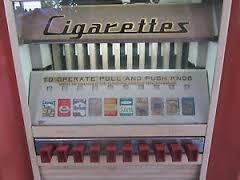Back when Fred Flintstone was puffing away on Winston cigarettes in the 1960s (see below), it was hard to imagine the day would ever come when we would see the end of smoking in the U.S. But, much to the relief of our overburdened health-care system, some officials now dare to predict that the adult smoking rate will drop to 5 percent or lower by mid-century.
So, how is America breaking its addiction to tobacco, and what lessons can we apply to a similarly dangerous addiction -- the burning of fossil fuels?
For starters, the days when ashtrays were a fixture on nearly every office desk are long gone, thanks to restrictions on smoking in the workplace, restaurants, airlines and other confined spaces where humans must share the air. Being a smoker today is, to say the least, inconvenient, as workers in cities like Minneapolis must sometimes brave 10-below wind chill to satisfy their nicotine fix.
While restrictions are making smokers outcasts, there's an even more powerful incentive to quit or never take up this nasty habit: economics.
 I risk dating myself here, but I can recall a time when every diner in America had a vending machine in which you could drop two quarters, pull a lever and acquire your favorite pack of smokes. These days, that same box of Marlboros will set you back $6 in some places, courtesy of the heavy state and federal taxes placed on cigarettes.
I risk dating myself here, but I can recall a time when every diner in America had a vending machine in which you could drop two quarters, pull a lever and acquire your favorite pack of smokes. These days, that same box of Marlboros will set you back $6 in some places, courtesy of the heavy state and federal taxes placed on cigarettes.
At a certain point, people are confronted with the total insanity of spending over two grand a year to increase their chances of getting lung cancer, money better spent on things like, oh, groceries. Teenagers working minimum-wage jobs, even those who flunked algebra, can easily do the math and figure out that a pack-a-day habit eats up maybe a quarter of their paycheck.
The taxes we place on tobacco are a prime example of an economic tool called Pigovian taxation, named after an early 20th century economist named Arthur Pigou. Many conservative economists subscribe to this school of thought, which maintains that the free market normally produces things that are good for society. There are times, Pigou argued, however, when the market fails. Those times occur when something imposes a cost to society that is not reflected in its price. When that happens, it is necessary to correct that market failure with a tax.
Cigarette smoking imposes tremendous costs to our society. The Centers for Disease Control and Prevention attributes 480,000 deaths per year in the U.S. to smoking, including 42,000 deaths from secondhand smoke. The economic cost is equally staggering: $133 billion in direct medical care for adults and more than $156 billion in lost productivity.
By imposing a heavy tax on cigarettes, some of those costs are now reflected in the price Americans pay for tobacco. That steep price is discouraging people from buying cigarettes and helping us move toward a smoke-free society.
In a similar way, conservative economists -- from Greg Mankiw, to Douglas Holtz-Eakin to George Shultz -- believe a Pigovian tax should be applied to fix the market failure surrounding fossil fuels. These fuels are relatively cheap because, like tobacco years ago, their costs to society are not accounted for in their price.
Those costs include treating respiratory and other health problems associated with air pollution. They also include costs associated with climate change, which will get higher in years to come if we fail to reduce greenhouse gas emissions. We're talking about damage from weather-related disasters made worse by global warming, higher food prices stemming from crop shortages, and deaths and hospitalizations caused by extreme heat.
The failure of Congress to treat our fossil fuel addiction the same way we treated our tobacco addiction is forcing President Obama to deal with climate change through a regulatory process abhorred by conservatives.
Such regulations would be unnecessary if Congress enacted a steadily-rising tax on the carbon content of coal, oil and gas. This would correct the market failure that makes fossil fuels our first option to generate electricity and provide transportation. If revenue from such a tax returned to households, we can break our carbon addiction without imposing economic hardship on families. Border tariffs on imports from nations that lack a similar pricing mechanism will motivate other countries to follow our lead.
Taxes are already helping us to kick the tobacco habit. They can help us kick another equally harmful habit and preserve a livable world for our grandchildren. As Fred would say, "Yabba-dabba-doo!"
